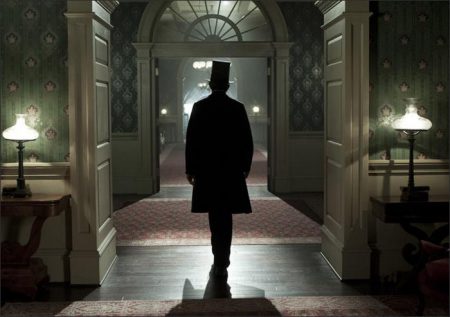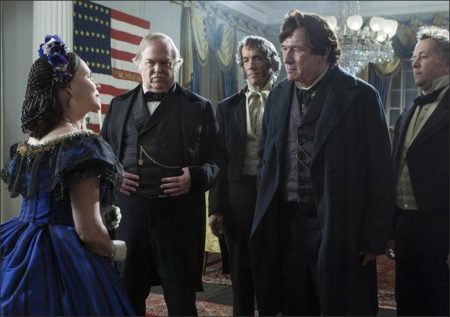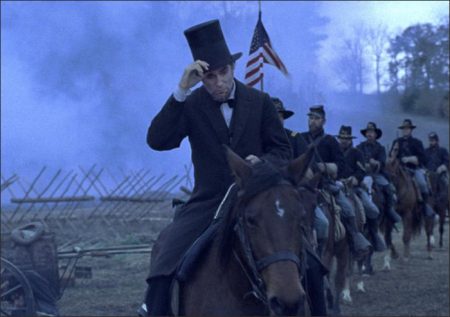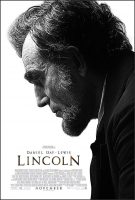It’s January, 1865, and US President Abraham Lincoln has just started his second term in office as an immensely popular leader, especially among his supporters, because of his down home attitude. However, the country is in turmoil with the Civil War entering its fourth year and having taken the lives of many a soldier on both sides.
Lincoln believes that passage of the Thirteenth Amendment to the Constitution – which would abolish slavery – would most importantly achieve something in which he believes to his core, but also end the war as slavery is a large part of the raison d’etre for it. The Amendment has already passed in the Senate, and is scheduled for vote in the House of Representatives at the end of the month.
While he is assured of yes votes from his fellow Republicans, he and his team have to work hard behind the scenes to assure enough yes votes from Democrats, which may require some compromise in other areas. But other factors may also come into play on the vote, such as the Confederate forces in the war issuing their own compromise to end the war but keep slavery. Meanwhile, Lincoln also deals with his oft supportive but oft tumultuous relationship with wife Mary Todd Lincoln, and their latest possible rift in oldest son, Robert Todd Lincoln’s want to leave law school to enlist.
Lincoln is a 2012 American historical drama film directed and produced by Steven Spielberg, starring Daniel Day-Lewis as U.S. President Abraham Lincoln. The film also features Sally Field, David Strathairn, Joseph Gordon-Levitt, James Spader, Hal Holbrook, and Tommy Lee Jones in supporting performances. The screenplay by Tony Kushner was loosely based on Doris Kearns Goodwin’s biography Team of Rivals: The Political Genius of Abraham Lincoln, and covers the final four months of Lincoln’s life, focusing on his efforts in January 1865 to have the Thirteenth Amendment to the United States Constitution passed by the United States House of Representatives.
Filming took place in Richmond, Fredericksburg, and Petersburg, Virginia. In reference to Petersburg, according to location manager Colleen Gibbons, “one thing that attracted the filmmakers to the city was the 180-degree vista of historic structures” which is “very rare”.
The Virginia State Capitol served as the exteriors and interiors of the U.S Capitol, and the exteriors of the White House. The House of Delegates inside the building was remodeled to fit for The House of Representatives Chamber set. Scenes representing Grovers Theatre were filmed in Fredericksburg, Virginia, at Virginia Repertory Theatre’s November Theatre.
John Williams composed and conducted the score. The score was recorded by the Chicago Symphony Orchestra and the Chicago Symphony Chorus. The soundtrack album was released by Sony Classical on November 6, 2012. All music was composed by Williams, except “Battle Cry of Freedom,” which was written in 1862 by American composer George Frederick Root (1820–1895) during the American Civil War.
Film Review for Lincoln
I’ve rarely been more aware than during Steven Spielberg’s “Lincoln” that Abraham Lincoln was a plain-spoken, practical, down-to-earth man from the farmlands of Kentucky, Indiana and Illinois. He had less than a year of formal education and taught himself through his hungry reading of great books. I still recall from a childhood book the image of him taking a piece of charcoal and working out mathematics by writing on the back of a shovel.
Lincoln lacked social polish but he had great intelligence and knowledge of human nature. The hallmark of the man, performed so powerfully by Daniel Day-Lewis in “Lincoln,” is calm self-confidence, patience and a willingness to play politics in a realistic way. The film focuses on the final months of Lincoln’s life, including the passage of the 13th Amendment ending slavery, the surrender of the Confederacy and his assassination. Rarely has a film attended more carefully to the details of politics.
Lincoln believed slavery was immoral, but he also considered the 13th Amendment a masterstroke in cutting away the financial foundations of the Confederacy. In the film, the passage of the amendment is guided by William Seward (David Strathairn), his secretary of state, and by Rep. Thaddeus Stevens (Tommy Lee Jones), the most powerful abolitionist in the House. Neither these nor any other performances in the film depend on self-conscious histrionics; Jones in particular portrays a crafty codger with some secret hiding places in his heart.
The capital city of Washington is portrayed here as roughshod gathering of politicians on the make. The images by Janusz Kaminski, Spielberg’s frequent cinematographer, use earth tones and muted indoor lighting. The White House is less a temple of state than a gathering place for wheelers and dealers. This ambience reflects the descriptions in Gore Vidal’s historical novel “Lincoln,” although the political and personal details in Tony Kushner’s concise, revealing dialogue is based on “Team of Rivals: The Political Genius of Abraham Lincoln” by Doris Kearns Goodwin. The book is well-titled. This is a film not about an icon of history, but about a president who was scorned by some of his political opponents as just a hayseed from the backwoods.
Lincoln is not above political vote buying. He offers jobs, promotions, titles and pork barrel spending. He isn’t even slightly reluctant to employ the low-handed tactics of his chief negotiators (Tim Blake Nelson, James Spader, John Hawkes). That’s how the game is played, and indeed we may be reminded of the arm-bending used to pass the civil rights legislation by Lyndon B. Johnson, the subject of another biography by Goodwin.
Daniel Day-Lewis, who has a lock on an Oscar nomination, modulates Lincoln. He is soft-spoken, a little hunched, exhausted after the years of war, concerned that no more troops die. He communicates through stories and parables. At his side is his wife, Mary Todd Lincoln (Sally Field, typically sturdy and spunky), who is sometimes seen as a social climber but here is focused as wife and mother. She has already lost one son in the war and fears to lose the other. This boy, Robert Todd Lincoln (Joseph Gordon-Levitt), refuses the privileges of family.
There are some battlefields in “Lincoln” but the only battle scene is at the opening, when the words of the Gettysburg Address are spoken with the greatest possible impact, and not by Lincoln. Kushner also smoothly weaves the wording of the 13th Amendment into the film without making it sound like an obligatory history lesson.
The film ends soon after Lincoln’s assassination. I suppose audiences will expect that to be included. There is an earlier shot, when it could have ended, of President Lincoln walking away from the camera after his amendment has been passed. The rest belongs to history.
Lincoln (2012)
Directed by: Steven Spielberg
Starring: Daniel Day-Lewis, Sally Field, David Strathairn, Joseph Gordon-Levitt, James Spader, Hal Holbrook, Tommy Lee Jones, John Hawkes, Jackie Earle Haley, Bruce McGill, Tim Blake Nelson
Screenplay by: Tony Kushner
Production Design by: Rick Carter
Cinematography by: Janusz Kaminski
Film Editing by: Michael Kahn
Costume Design by: Joanna Johnston
Set Decoration by: Jim Erickson, Peter T. Frank, Charles Maloy
Art Direction by: Curt Beech, David Crank, Leslie McDonald
Music by: John Williams
MPAA Rating: PG-13 for an intense scene of war violence, some images of carnage and brief strong language.
Distributed by: DreamWorks Pictures, Paramount Pictures
Release Date: November 9, 2012
Hits: 91






